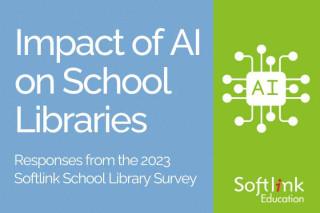- Your School Type
- Solutions
- Resources
- Blog
- Events
- More
- Contact Us
- Book a Demo
- Get a Quote

The annual Softlink School Library Surveys, school library staff are given the chance to express their perspectives on working in a school library through a series of open-ended questions. Despite acknowledging the difficulties they encounter, it is clear that their dedication and love for their profession not only shine through but also outweigh the challenges.
In the 2023 Australian School Library Survey, we wanted to explore this further so asked the question:
"What do you see as the main impact of AI on school libraries moving forward?
We had a fantastic response, with valuable feedback shared by school library staff across Australia. In collating these comments, the following themes emerged:
In our latest feature document, we share a selection of comments around these themes.
A summary of the responses is included below.
Based on the responses, it is clear that artificial intelligence (AI) has a lot of promise to positively influence school libraries in the future. An important finding is the focus on incorporating AI into information literacy courses, emphasising how technology can help students develop their critical thinking abilities and retrieve information quickly.
With algorithms suggesting resources that are specifically designed to meet the interests and learning styles of each individual, a large number of respondents acknowledge AI as a useful tool for improving personalised learning experiences. Furthermore, the ability of AI to optimise library operations—from resource management to cataloguing—is becoming acknowledged, with the ultimate goal of enhancing accessibility and efficiency in the library setting.
The replies as a whole show that everyone is aware of AI's potential to strengthen school libraries' status as vibrant centres of learning and knowledge."
“Hopefully it will make data crunching easier to access and quick. It will allow us to see the relationships between things much easier. It means we will have to teach students how to write a quality prompt and how to critically analyse responses."
"Improved workflow practices, changes in the way access and information is delivered."
“Librarians have always acted as a conduit and interpreter between students/staff and the copious amount of information/disinformation available online. We are able to navigate through all resource formats to find specific, relevant, and current sources readily available for immediate use. AI is simply another format, providing greater opportunities for devising, developing, programming, presenting, and evaluating library services in schools, addressing the curriculum, diversifying content, assessing facts, and creating material/ displays/curriculum content in an ever-changing library environment with constantly evolving time constraints and syllabus expectations.”
So many things! I think recommending books will be streamlined and more powerful because algorithms will become more sophisticated. I think we have a duty to teach students how to use AI technology ethically and to help them see it as a tool and not a crutch when it comes to research. It has enormous potential to reach parents who are learning English (through automated translation tools) which means more parents can support their child to read (by connecting with content made by TLs and translated by AI).
Looking at the replies about how AI would affect school libraries, there is a general feeling of anxiety. Numerous library employees voice worries regarding the possible decline in critical research abilities and a drop in the quality of the literature being accessed.
There is a widespread concern that AI could encourage students to become lazy and rely more on fast fixes than on real research. In addition, one major concern is the absence of human interaction and individualised assistance, which are essential components of the library experience.
These findings highlight the complex problems with teaching, authenticity, and maintaining human connection that AI integration presents for school libraries in the future.
“Students will see it as an easy way out rather than seeing it as a tool that you have to use correctly for it to be beneficial.”
“I think it is a threat to critical thinking, and promotes cheating at this stage. We need some good, simple guidelines to help us guide students in research practices.”
“The lessening of interest in actual research techniques because even primary school students don't see the need when you can just AI it.”
Students may fail to see the relevance of the school library to their learning. This is already starting to happen. Students and staff often neglect the Library as a useful source of information and ideas, preferring to scan the internet for information. AI will become a new "easy" source of information. We need to learn how to harness the power of AI so it can be used in a positive way for learning.
The 2023 responses on AI's impact on school libraries were categorised into positive and negative perspectives, alongside indifferent and unsure attitudes.
Positive perspectives emphasised how AI may improve resource accessibility, customise education, and reduce administrative burdens.
On the other hand, drawbacks included the decline of conventional research techniques, an excessive dependence on content produced by artificial intelligence, and moral quandaries.
These observations highlight the need for thoughtful adaptation to maximise AI's benefits while minimising related dangers providing educators and policymakers with a nuanced understanding as they manage AI inclusion in school libraries.
To download the full feature document, visit our resources page.